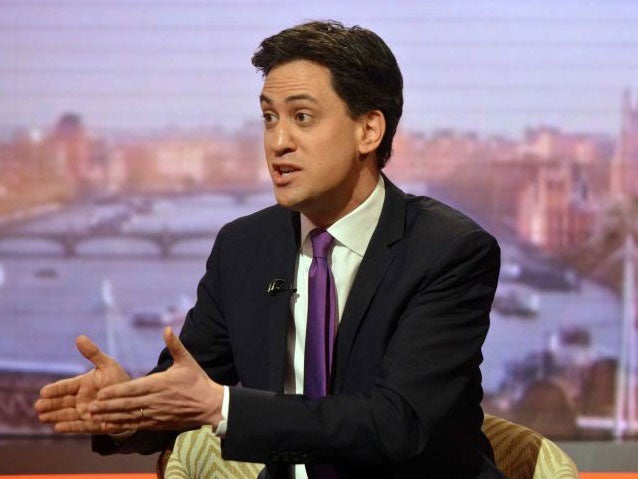Give Ofgem the power to force providers to cut energy bills, says Ed Miliband
Labour wants the British public to see the benefits of the plummeting oil price

Your support helps us to tell the story
From reproductive rights to climate change to Big Tech, The Independent is on the ground when the story is developing. Whether it's investigating the financials of Elon Musk's pro-Trump PAC or producing our latest documentary, 'The A Word', which shines a light on the American women fighting for reproductive rights, we know how important it is to parse out the facts from the messaging.
At such a critical moment in US history, we need reporters on the ground. Your donation allows us to keep sending journalists to speak to both sides of the story.
The Independent is trusted by Americans across the entire political spectrum. And unlike many other quality news outlets, we choose not to lock Americans out of our reporting and analysis with paywalls. We believe quality journalism should be available to everyone, paid for by those who can afford it.
Your support makes all the difference.Energy companies would be forced to pass on to consumers any cuts in the wholesale price of oil and gas, under proposals set out by Ed Miliband.
The Labour leader called for the energy watchdog, Ofgem, to be given legal powers to intervene if it believes prices are being kept artificially high. He urged the Government to fast-track legislation to give Ofgem the new powers ahead of May’s general election.
Mr Miliband’s intervention, part of Labour’s drive to focus on living standards, follows a 50 per cent fall in the wholesale price of oil over the past six months.
The Chancellor, George Osborne, has launched a Treasury inquiry into whether the savings are being passed on to families. But yesterday Mr Miliband challenged him to “put his money where his mouth is” and make it mandatory for energy companies to reduce tariffs in line with their costs. “We want to see those reductions in wholesale costs passed on to consumers,” the Labour leader said. “We see wholesale costs go down 20 per cent in gas prices over the last year and no reduction in bills.”
Labour will table a Commons vote on its proposal on Wednesday, saying that the necessary legislation could be rushed through before the election. Mr Miliband told BBC1’s Andrew Marr Show yesterday: “We have got a zombie Parliament which isn’t doing anything, isn’t actually passing much legislation. Let us, in the last three months of this Parliament, do something which will actually make a difference. Let us reduce energy bills for consumers. We can do that as well as having this freeze to make sure energy bills do not rise.”
The cost of Brent crude oil has plummeted from $115 (£75) a barrel to less than $50 (£33) in the past six months.
Ann Robinson, the director of consumer policy at the price comparison website uSwitch, said: “With the average [domestic fuel] bill now at £1,265 – 168 per cent higher than a decade ago – any measure that could help relieve the pressure on hard-pressed consumers should be seriously considered. While quick to pass on rising costs, the ‘big six’ energy suppliers have yet to reduce bills for the majority of their customers who are on standard tariffs.”
Mr Miliband’s call came as he proposed the creation of an official Living Standards Index, with equal status to gross domestic product figures, so that governments can be held to account on their record on improving ordinary families’ finances, as well as their performance on economic growth. He has asked the chairman of the UK Statistics Authority, Sir Andrew Dilnot, to consider compiling a new quarterly index tracking the impact of wages, prices, taxes and benefits on incomes.
Labour insists that, despite the economic recovery and increasing employment, the vast majority of families are worse off than five years ago as pay has failed to keep pace with prices. It says the average working person is £1,600 a year poorer than in 2010.
Join our commenting forum
Join thought-provoking conversations, follow other Independent readers and see their replies
Comments